Thailand Never-ending TerrorismAugust 2009
In the three provinces of Pattani, Yala and Narathiwat in the furthest south of Thailand, which are called the Deep South, more than 3,500 people were killed in terrorist attacks during the past five years. The population of the three provinces put together is about 1,700,000, which is almost equivalent to that of the prefecture of Kagoshima in Japan. To see the figure, it looks as if the civil war were being carried on.
The Ministry of Foreign Affairs of Japan recommends Japanese tourists to postpone the trip to the area because a gun or bomb attack occurs almost every day now. Most people think that there is an armed Islamic group who advocates separatist movements and resists being governed by the central government and they are the mastermind of these attacks. I flew to the Deep South of Thailand to see the fact.
The break of day in Pattani
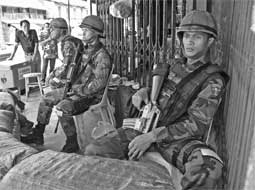
Rusa Milae of Pattani City is on sand soil, facing the South China Sea. Before 5:00 a.m. the dark town resounded with Athan, the Islamic call to prayer. The expression “Allah is the greatest” was repeatedly recited in Arabic. Athan plays a similar part to church bell ringing. Having heard Athan, a fisherman Mr. Uma (56) wearing a white Muslim prayer cap started for a mosque. In the Uma family men and women never pray or eat together. His wife wearing a chador that covers the whole body except a face and hands stays at home and teaches Koran in Arabic to her daughters, who are covering their heads with scarves. The children speak the Yawi dialect at home and speak Thai, Thailand’s official language, at school, so they are learning three languages altogether. Women look to be oppressed, but his wife and daughters seem to take it for granted and have no complaints about it.
The Muslims in Thailand account for about four percent of the population of Thailand, while the Muslims in the three provinces of the Deep South account for 80 percent of that of the Deep South. In this area there used to be an Islamic state called the Malay Kingdom of Patani from the 13th century to 1909, when the kingdom was annexed by the Kingdom of Thailand. Pattani was the capital of the Kingdom of Patani and a major port of the South China Sea, so that Indian Muslim merchants often visited this place, and Chinese merchants who had immigrated from South China became believers in Islam. Krue Sae Mosque and the mausoleum of Lim To Khiam, a Chinese, who built the mosque, standing in the suburb of Pattani have some traces of the past.
The incidents that occurred five years ago
Anti-government movements for autonomy and separation had strength from around 1950 to 1970. Its strength, however, was on the decline because of the Thai government’s reconciliation policy. The serial terrorist attacks continuing up to now started from the large-scale armed clash that occurred on April 28th, 2004. Mr. Kosaree Awae, a researcher of the Research Center for Peace Building, Mahidol University, said, “Many people were killed in the incidents at Krue Sae Mosque and in front of Tak Bai police station five years ago. If the government officials in charge of public security had talked with the assailants and there weren’t such heavy casualties, the situation would have settled down and would not have been as bad as it stands.
On April 28, 2004 young Muslims attacked a police box and a checkpoint, and then 30 out of them holed up in Krue Sae Mosque and were all shot dead by the besieging Thai Army. The death toll in this day alone was 108 including the dead at other places. Five out of them were police officers and military men. The assailants were dressed in all black, and a document titled “Jihad in Pattani,” which said that you would not die even if you were stabbed with a knife, was found, so the authorities announced this was committed by an extremist Islamic group. But the families of the deceased were enraged at the announcement. They suspected the young Muslims were killed after they had surrendered unresistingly because the young men had been ordinary workers or soccer companions and most of them were shot in the back of the heads. So they buried these young Muslims as martyrs. Immediately after the incident, Deputy Prime Minister Chavalit dismissed General Pallop of the Internal Security Operation Command from his post on the grounds that Pallop had disobeyed the order and carried out the raid on the mosque. But it was not enough to ease Muslims’ hostility.
The education of Muslims
Mr.Uma has eight children with a 21-year-old son at the top. He gives them an Islamic upbringing about food, clothing and gender, and he also sends his children to Islamic school. He said to me proudly that his eldest son goes to an Islamic university in Pattani. In this university not only Thai students from all parts of the country but also many foreign students from neighboring countries like Malaysia, Brunei and Indonesia are studying. “Uneducated people are badly off and cannot earn the respect of their family and friends these days. They are put in a terrible situation. I want my children to get a high education so that they will not lead a life like mine,” he said.
As an assimilation policy, the Thai Government applied a registration system to those Islamic schools and has provided financial support and guidance on curriculum. Islamic and public schools, however, have different values and behavioral patterns. For instance, in an Islamic school boys and girls study in separate classrooms and male teachers teach boys and female teachers teach girls. Even if a Muslim studies in the Middle East to deepen his knowledge of Islam and improve his Arabic language ability, he would have little opportunity to get a job in Thailand. This is one of the causes of Muslims’ chronic poverty.
I asked Mr. Uma whether he had misgivings that his children might be bewildered by a conflict between the values of Muslims’ and other peoples’ over freedom and human rights when they get to know the wide world with higher education. He said, “They’ll have no problem with that, because our children have believed in Islam since their childhood. My daughter wants to be a teacher and she will be able to teach children in the Islamic way.” From the premise that his children will live within the Muslim community, he seems not to have the slightest worry about that.
Soldiers in an elementary school
In an elementary school, where a bomb was detonated by terrorists, soldiers with riffles were playing with children. “Now children are accustomed to soldiers’ presence. And they like military uniforms. So soldiers have not given any bad influence on children, and the military is supporting our school activities,” a teacher of the school said as if this was one scene of daily life. At school meals Islamic food is prepared for both Muslim and Buddhist children, though Buddhists don’t have any taboo on food. “There is nothing we have to pay special attention to. The children understand each other through a domestic upbringing, which is most important.” It is not so difficult for the teachers in this village to teach the pupils in the same school if they have different religious values, because in this village Muslims and Buddhists have lived together, helping each other. “Muslim children learn the Yawi dialect at a private school because it is their own language, but we teach Thai at school because Thai is essential for them to live in Thailand.” Obviously, assimilative education has been carried out.
Unseen plot
Terrorism in the Deep South is incomprehensible. Five years ago it was police and military facilities that were targeted by terrorists. But after that terrorist have attacked even towns where many civilians live. 90 % of the victims were the general public. Mrs. S (62), an owner of a general store in the market which was located in the suburb of Yala City said, “Just as a soldier had passed in front of my store, a bomb exploded at the public square.” She pointed at the spot not more than 30 meters away. She continued, “I ran into the house at once, and other people also ran into my house. Besides the wounds, I have had a buzzing in my ear after that. So I’ve been seeing a doctor regularly.” She still has a piece of gauze on her right ear. 40 years ago she moved to this village after marriage. Although she is a Buddhist, she has gotten along well with Muslims. They have helped each other, sometimes by sharing food. So she has no intention of moving away from this place simply because there was a terrorist attack. Terrorists normally attack police stations, air ports or hotels for the purpose of appealing to the government and world opinion. However, the purpose of bomb attacks at a market in a country town like here is quite beyond my comprehension.
On July 14, 2005 a power station in a city of Yala Province was bombed, which caused a blackout in the city. During the blackout simultaneous terrorist attacks were made at several places including a department store and a hotel. Then the Thai Government declared a state of emergency in the three provinces of the Deep South. Checkpoints were set up on the national road in every town and village. Sandbags were piled up and soldiers with an automatic rifle were checking motorbikes and cars. Moreover, a platoon with a bomb detector was patrolling, checking gathering places for a bomb. When I entered the Deep South, my cell phone service was interrupted. That is one of the measures to deal with terrorism. A cell phone might be used to produce an explosion by remote control, so the radio wave of a cell phone with an unregistered number will be cut off.
Along the street I walked up and down to cover the story, I saw the debris of blasted offices and shops remain without being cleaned up. Just a half day ago there was an incident. Someone informed the police that there was a dead man in a motorcycle shop, so policemen rushed to the shop and found the shop owner murdered and a bomb planted on a motorcycle. The way of acts of terrorism has been getting craftier like this.
A special procedure beyond the law leads to a morass
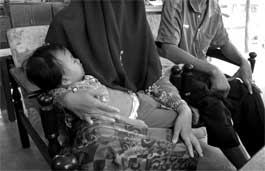
There is a Japanese Muslim living in this Deep South for ten years. His name is Kenichiro Hara (32). He teaches Malay at Pattani Campus of Prince of Sonkla University. “We could go out at night safely before, but we can’t now. When I see a motorcycle coming, I’m scared that I might be shot. The image of this place as a dangerous place is established, so that we don’t get any new students from the outside of this province. This situation is intolerable.” While Mr. Hara wants to move out if he can get a job in another place, he is indignant over the ill-treatment of the local people. “There is no law for public peace and order in this country, but instead policemen nab people without an arrest warrant.” Actually his students’ parents and relatives were arrested without any evidence and they were detained for questioning from two weeks to seven months. “Even if a person who has been arrested by a special procedure beyond the law turns out to be innocent, compensation will not to be paid at all. It is natural that they should be angry.”
I interviewed a Muslim rubber plantation worker in his 30s, who was arrested on suspicion of murder, at a lawyer’s office in Yala City. He was bail out by giving a title deed of his relative’s land instead of money. Now He was consulting with a lawyer. “All I do is work at the plantation and teach children the Yawi dialect and our religion at a private school. The police and the military seem to hate the people who follow the precepts of Islam faithfully,” he said.
When he was up in a tree to pick jujubes, a policeman came with a soldier and took him to the police station. He fell under suspicion of murdering a Muslim worker who had also worked in the same rubber plantation. When he was put in a lineup at the police station, a little child pointed at him. That was the only evidence, he said. His wife holding a baby in her arms said, “Even though they want to liquidate all Muslims, they cannot touch children because they are innocent. But they think if they get rid of adults who are educating children, they can educate the children as they like, I presume.” Indeed, many teachers have been attacked and more than 120 teachers were killed in the past five years.
Preparing for the trial, his lawyer Mr. D. H. (60) said, “His case is a sort of bullying, but the case of 80-odd people’ being killed in trucks was a political matter. The government’s tedious explanation cannot convince us.” He deplores that unreasonable arrests that can be taken as oppression and executions that can be taken as slaughter are adding fuel to the terrorist issue and dragging it into a morass. “Discrimination against Muslims here will develop into a grave issue.” Mr. D. H. pointed out the peculiarity of this region.
An attack at a mosque
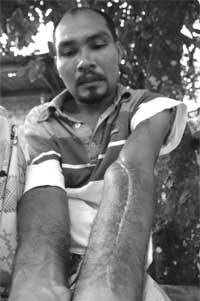
An incomprehensible massacre occurred at Ai Pa Yay village, Narathiwat at 8 p.m. on June 8th this year. Muslims praying at a mosque, of all things, were attacked by gunmen. They fired more than 100 shots and 12 people were killed, 10 were seriously wounded. Only two people were unwounded. I visited the mosque in Ai Pa Yay. The marks of the bullets at that time still remain on the walls and windows inside and outside of the building “We heard a volley of shots around us,” said the survivors, Mr. M (36) and Mr. A (46). They testified that there were many gunmen, but they couldn’t afford to see what assailants were like. Mr. M was shot through the arm from the shoulder vertically and Mr. A was shot through the abdomen from the behind. Both of them don’t need to apply gauze on their wounds now but they have become disabled and Mr. M has his arm in a sling and Mr. A walks on crutches. They said this village had been peaceful before the incident and there had been no sign of attack such as a threat.
The Thai Government claims Islamic extremists aiming at separation and independence carried out this attack. But Mr. A asserts the government’s statement is arrant nonsense, and Mr. M contradicts the statement. He said, “What do you think of it? It is impossible that Muslims could have attacked Muslims at prayer.” None of the villagers of about 450 are satisfied with the statement either. Judging from the streak marks of the bullets that were found at the site, the weapon proved to be the same AK47 rifle as used in the murder case in January 2008, and a Thai Buddhist Suttirak was placed under arrest when I was in the Deep South. “Do you think there is a conflict between Muslims and Buddhists on the root of the incident?” I asked. “I think it is one of the causes. If a Buddhist is killed, Buddhists always blame it on Muslims these days, and vice versa. The problem will never be solved,” Mr. M replied
A platoon has been deployed at Ai Pa Yay village since the incident occurred. The platoon leader said, “We are ordered to guard the frightened villagers so that they can work as usual. Compared with Pattani where something happens every day, this place is rather peaceful.” Soldiers with a rifle, however, seem to be out of place in such a quiet village, and it is hard to say the villagers don’t feel a sense of oppression in their presence.
How do the Muslims feel?
Mr. Uma, who enjoys the confidence of the community, was appointed the vice-chairman of the ward assembly and has been in charge of the maintenance of land and infrastructure. In his opinion the most of the Muslims in these three provinces think that there is someone behind these acts of terrorism, but they don’t know who the wirepuller is because the terrorists are not Muslins. Since the members of Islamic community are close to each other, they know who is doing what. The government has to search the mastermind whom they should fight against, but the present government has taken irrelevant measures. How could we poor Muslims get arms and ammunitions?”
Mr. Uma remarked on the groups aiming at autonomy and separation from Thailand, “These three provinces are a part of Thailand indeed, but it is true that the land is Islam’s. Muslims desire to govern the Islamic land on their own responsibility. I personally hope that their desire will be realized.” His remark surprised me at first. But he must have spoken for the Muslims in this area because he understood the point of my question. “If someone is trying to manipulate information to break up Muslims, there is a possibility that some troubles over separation and autonomy will arise. I have no idea who lays such a plot, but the government should have grasped it,” he said prudently because he works for the ward office.
The stance of the Thai Government
At the front gate of Yala provincial office a crossing barrier and an examination stand were set up and every vehicle has been examined carefully for a bomb. The death toll was 314 in 2004, but it went up to 1015 in 2007. I interviewed, Mr. Kritsada Boonraj, Deputy Governor of Yala province, on how the supreme administrative office views a series of terrorism.
“Judging from the investigation report by the persons in charge of the national public peace and order, I can say positively that these attacks were not carried out by international terrorists. These troubles have been caused by social discord and conflict within the country. Some Muslims have a false idea that Muslims are oppressed, and they cause troubles. They are trying to tell to the government and public officials that they are treated unfairly. They are appealing to the government to give more attention to them and develop their area. Deputy Governor Kritsada Boonraj denied that there was an independence movement on the grounds that more than 60 percent of Muslims in this area vote in a national election and celebrate a festival for the king. He said, “Although these incidents are extreme, they are not such conflicts as occurred in East Timor or such troubles as occurred in North Ireland. They are a sort of crime.
On the next day of the attack incident at the mosque in Ai Pa Yay village which occurred in June of this year, the Thai Government decided to appropriate a budget of four hundred million baht for the relief of the victims of terrorism. The money is to be used not only for the relief of the victims but also for community development. The government tries to enlist Muslim’s cooperation to smoke out terrorists. Deputy Governor Kritsada Boonraj said that they dispatched public servants in plain clothes to the villages to cope with complaints of the locals and to help the locals with forming their autonomous organizations. As the result the number of terrorist attacks, which was 800 a year at its peak, has decreased and it is estimated that the number will be less than 300 this year, he said.
Muslims live frugally in this world
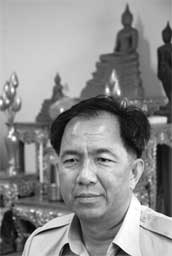
The Thai’s economy has made the most progress in ASEAN (Association of Southeast Asian Nations) since1980s. An associate professor of the economy department of Chulalongkorn University, Kongsak Sonteperkswong, a Chinese from the southern part of Thailand, analyzing the background of a series of terrorism, said, “Although the Deep South is rich in gum trees and tin, and fisheries, they have been too contented with their life style. Only when they need a cash income, they go to the woods to tap a gum tree. In Thailand highly motivated workers are Chinese, Thai and Muslims in that order. That has produced differences in education and finances. Now that Muslims have been gaining power worldwide, Muslims here are also coming out, saying ‘We are oppressed and treated unfairly.
The bird in a cage under the eaves was singing and I heard Mr. Uma hammering in the mouth of a river, where someone was smashing cashew nuts. Mr. Uma, a local Muslim, busies himself repairing his old fishing boat whenever he finds time. The people in the other parts of Thailand have lost their own culture and changed their life styles because they have been well off with foreign money. However, Muslims in the three provinces of the Deep South have kept their culture faithfully, even though they are said to be left behind the economic development. They have their own way of living. For instance, they speak their own language; they spend time in their own way for Islam’s five daily prayers; they will not charge interest between Muslims; and they never cremate a dead body. Their peculiar culture based on Islam is deeply rooted in this area.
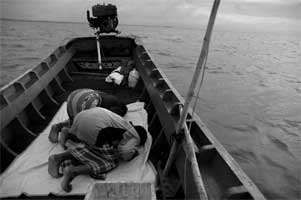
Since Mr. Uma’s regular work is fishing, he and his son go fishing at sea from the evening, weather permitting. They have fished by a gill-net method for more than 20 years in a small wooden boat. His son dropped the gill net down into the water, and he started cleaning the boat for today’s fourth prayer. When the sun sets, even at sea they change from their clothes into the traditional costume and purify themselves by washing their hands and mouths with fresh water that they have brought in a plastic container with them. They pray facing toward Mecca that is far beyond the horizon.
After prayer they started pulling up the net. “As the tide is like this, we can’t catch any. From the beginning of this month we have had only bad days like today.” He earns only 3000 yen from a catch, if he has a catch, from his small coastal fishery. Believing they’ll be able to go to Heaven, Muslims live frugally in this world, following Islamic precepts faithfully. Next month is to be fast month, or Ramadan, when Muslims do not eat, drink or smoke between sunrise and sunset for 29 days to 30 days starting on the day after the new moon is seen in the ninth month of the Muslim year. Mr. Uma’s wife cooked mackerels which Mr. Uma had fished. She fried them. Having a late dinner, Mr. Uma talked about Ramadan. “All Muslims in the world fast, thinking of living in poverty. Even the rich share hunger with the poor without eating. No matter how rich you may be, you’ll be hungry during Ramadan.”
It is not only in the Deep South of Thailand that the new free economy is now at a standstill and differentials are getting wider. In Islamic states whose people were once westernized, the phenomenon of reversion is observed and in Western countries Muslim population has increased including immigrants out. If this never-ending terrorism is not passed off as a matter of the domestic affair of Thailand, a clue for eradicating terrorism may be found here.

